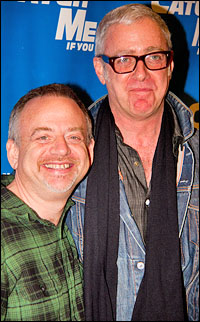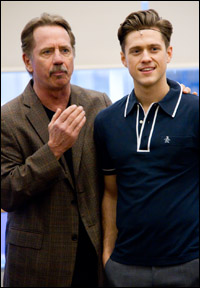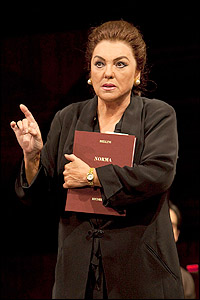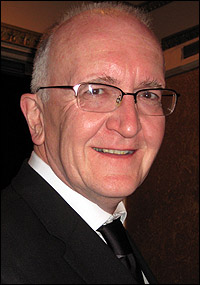
*
Terrence McNally's 20th Broadway production arrives July 7 at the Samuel J. Friedman, under the auspices of Manhattan Theatre Club — a revival of his Tony-winning Best Play of 1995, Master Class, starring Tyne Daly as Maria Callas.
Still playing, no doubt, will be his 19th — which he wrote with Marc Shaiman and Scott Wittman, Catch Me If You Can, now on the runway at the Neil Simon — doubling the theatre-going pleasure of his company.
Having two hits simultaneously charging away on all cylinders is no novelty for McNally, but it is a nicety eminently worth celebrating: On March 28, The Acting Company has hired a hall — the Longacre, in all its pink La Cage aux Folles plumage — so the writer can see his career pass before his eyes in scenes, songs and anecdotes from "Angela Lansbury & Friends" (the aforementioned La Daly, Brian Stokes Mitchell, Edie Falco, Emily Skinner, Jason Danieley, Marin Mazzie, John Glover, Stephen Bogardus, Barbara Walsh, Alan Cumming, Raul Esparza, Bobby Steggert, Roger Rees, Malcolm Gets, Alexandra Silber and Joyce DiDonato).
Off-Broadway has been the venue for many a McNally play, and he has even made it to New York City Opera — via his libretto for Jake Heggie's Dead Man Walking, an outgrowth of his lifelong personal passion for opera. Last spring, that passion prompted a Kennedy Center mini-festival called "Terrence McNally's Nights at the Opera" — three in all: revivals of The Lisbon Traviata with Glover and Master Class with Daly, plus a new play: Golden Age. The last two of this festival are currently angling for New York dates, and the Kennedy Center will get him back in 2012 (June 1-July 2) with his version of Pal Joey. It's about time that Playbill.com checked in with McNally. What's keeping you busy these days?
Terrence McNally: There has been a lot of pre-production stuff on Master Class, and we're in discussion to do Golden Age next season at Manhattan Theatre Club. It takes place on the opening night of Bellini's I Puritani in 1835. It's the first historical play I've written — and the first play I've written, I guess, that doesn't have a contemporary American setting [it's set backstage at Paris' Theatre-Italien].
So much goes into getting shows on these days — the right cast, the right director, the right theatre, blah, blah, blah. The availability of people just seems to move glacier-like at times. We first talked about doing Catch Me If You Can six or seven years ago, whereas Ragtime — from the idea to the opening night in Canada — was, I think, a year. That's how it has changed so much.
You were on the Ragtime Express.
TM: Yeah. Well, I don't think anyone's on the express too much these days. It's moving slower. The economy has affected everything.
| |
 |
|
| Marc Shaiman and Scott Wittman | ||
| photo by Krissie Fullerton |
TM: No, this is an original musical. It's not the screenplay, with songs added. I thought it was a terrific movie, as I thought the movie of "The Full Monty" was terrific.
A lot of my inspiration came from the book, "Catch Me If You Can," by the real person. It's his life story. We're the only musical on Broadway that's a true story.
Frank Abagnale Jr., who passed several million dollars in bad checks and posed successfully as a Pan Am pilot as well as a doctor and a lawyer, was a 16-year-old runaway from Scarsdale, NY. He went to jail and did his time, but they shortened his sentence so he could come to work for the FBI. He's still connected with the FBI and very involved with developing all sorts of new security techniques. It's much harder to forge a check today than it was back in 1962. He'll be there on opening night.
Can you believe it's happening after so long?
TM: Yes, I can. A lot of that is the simple fact that, when you have so many talented people, they're all very busy. Marc and Scott took almost a year off to do that show for Martin Short. Jack O'Brien and Jerry Mitchell [the show's director and choreographer] spent a year in London working on Love Never Dies. [Producer] Margo [Lion], I think, produced a show in that period, The Wedding Singer…
And I'm assuming you busied yourself playwriting during all of this.
TM: I wrote a couple of plays while they were gone. The play that Nathan Lane and Marian Seldes did was, I think, written in this period — Dedication or The Stuff of Dreams. Then, I had a play in Philadelphia, Unusual Acts of Devotion, that we did two years ago and later in La Jolla. And now Golden Age, so I have been writing other stuff, too. Marc and Scott have done other things. Everyone has done other work. Just because it took six to seven years to get this show to its opening night on Broadway doesn't mean we worked on it 365 days a year. Everybody's been very busy and very successful. The day of shows happening quickly is gone, I'm afraid. It's the exception when a show does that.
| |
 |
|
| Tom Wopat and Aaron Tveit perform at a Feb. 10 press preview for Catch Me If You Can. | ||
| photo by Krissie Fullerton |
TM: Well, that's nice to hear because I truly love musicals, and I respect the form. Some people write a musical book and then leave a blank saying, "Song here." I don't do that. I write a full scene and hope Marc and Scott are going to find a song suggested by my dialogue that inspires them to write a song that will render anywhere from 15 percent to 80 percent of my dialogue unnecessary. The song does it. I have never written parenthesis "Song Here" end of parenthesis. Frank Abagnale sings a song about leaving home, so you write a scene about him leaving home and see how they musicalize it. A playwriting life is a very different art form. The main job a librettist does is structure a musical.
Do you have a favorite show that you've done?
TM: No, I don't have a favorite. I'll put it this way: There are none that I've turned on or said, "God, I wish my name weren't on it." I like them all. They're all a different story from the first idea to opening night. No experience in the theatre duplicates itself.
So it doesn't necessarily get easier the more you do it?
TM: No, it never gets easier. I wouldn't say it gets harder, either. It's just that each show has its own set of problems, its own set of personalities. I mean, working with Scott and Mark is very different from working with Kander and Ebb or Ahrens and Flaherty or David Yazbek. I've had wonderful collaborators. They're very different, just as actors are. Working on a show with Nathan Lane is different from working on a show with Chita Rivera. It keeps you on your toes because it's different every time.
| |
 |
|
| Tyne Daly as Maria Callas in Master Class at the Kennedy Center. | ||
| photo by Joan Marcus |
TM: Oh, very. Tyne gave an extraordinary performance at the Kennedy Center. It deserves to be seen in New York. She made it her own. I never found myself comparing her to anyone else who's done the part. I thought she was absolutely wonderful on her own terms — and I've been very lucky with my Marias: My God! from Zoe Caldwell to Patti LuPone to Dixie Carter, just on Broadway. Fanny Ardant had a great success in it in Paris, and there's a woman doing it in The Netherlands now who got extraordinary reviews and is kinda their leading actress there.
Was it easy for you to write Callas? It seemed like you were so connected to that character.
TM: Maria Callas was someone I've thought about since I was a very young person when I first heard her voice on the radio growing up in Texas. I fell in love with the sound of her voice. She has fascinated me. And then her life! That kind of inner turmoil of falling in love with and being rejected by one of the richest, most powerful men in the world — it's quite an extraordinary trajectory for anyone's life. It just seemed very theatrical to me. But when you sit down to write it, you don't know if anyone else is going to enjoy it or be interested in it. I'll never forget the first time we ever did it for anyone. Zoe and I and Lenny Foglia, the director, went to Big Fork, Montana, and read the play in a Town Hall sort of auditorium just to see how Normal People — non-opera, non-Callas fanatics, non-New York theatregoers — would react to the play. We took three planes and still drove for quite a while. It was a very long trip, but they loved it. When it was over, one of the questions was, "Is Maria Callas a real person?" Then the woman turned to her husband and said, "Ya see, I told you she was a real person." Someone else asked Zoe if she was a professional actress. Zoe said, "Yes, I am." The woman said, "You're very good." Zoe said, "Thank you." So we thought if the play works for an audience that doesn't know that, my God, this is the legendary Zoe Caldwell with 85 Tony Awards, then maybe the play has a chance elsewhere.
| |
 |
|
| John Doyle directs the Acting Company's March 28 salute to McNally. | ||
| photo by Aubrey Reuben |
TM: I wrote that for [Ragtime producer] Garth Drabinsky, and I guess the only word for it is that it's a radical revision. The score's the same. The same essential two characters — Joey and Vera — but almost everything else is pretty new. We did a wonderful reading of it with Harry Connick Jr. and Glenn Close, and Garth literally went from the reading to his office to find out that he had been replaced as the head of Livent, so we went nowhere with it. It has been put away for all these years. I don't know how the Kennedy Center got ahold of the script, but, when they said they wanted to do my version, I was thrilled. I gotta get back and look at it afresh now.
Did you bring songs in from other shows?
TM: A few, but not a lot. It's not one of those grab-bag Rodgers-and-Hart Greatest Hits sort of shows. Pal Joey doesn't need help that way. It's a pretty great score.
The book has always been problematic. The biggest challenge on Pal Joey is to make it an enjoyable show even if you don't morally approve of the two leads. I mean, Brooks Atkinson famously said, "Can you draw sweet water from a foul well?" He was so disapproving of both Joey and Vera as human beings that he found it hard to enjoy the show. I think they're human, and I'm attracted to them because of that. I don't think they're paragons of how we should all live our lives, but neither are some of the characters in Guys and Dolls or Gypsy. Some characters in famous musicals are maybe not the most perfect, moral people. The trick will be to make it a good show, and it's really a different version. I definitely don't want to talk about it. Maybe the biggest change is it's set very firmly in the World War II era.
That's not a big jump, though, is it?
TM: Read the original, and tell me when it takes place. It's very ambiguous. It takes place in Chicago, Gangsterland — there's crime going on the side, but you don't know.
Tell me about your Acting Company salute.
TM: People have told me I'm going to be very happy with it. John Doyle is directing it, and [producing artistic director] Margot Harley — it's her company — is producing it. I think there's going to be some scenes from plays I've written and, certainly, some music, so it's going to be exciting. Basically, I'm staying out of it because I want to be surprised.









